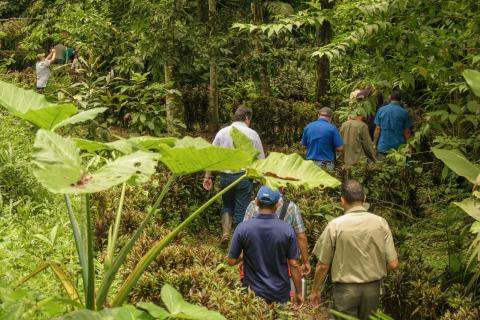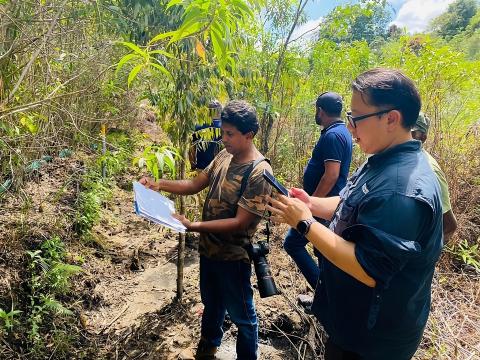Aligning with the global biodiversity agenda: A conversation with Jacob A. Sterling
Ahead of the global biodiversity summit, COP16, we spoke with Jacob A. Sterling, Senior Director, Head of Sustainability Advisory at Preferred by Nature, to learn about the event and how Preferred by Nature plans to align its work with the global biodiversity agenda.
Jacob brings over two decades of experience in sustainability and biodiversity. His career includes key roles at Maersk and the World Wide Fund for Nature (WWF) along with a strong background in tropical biodiversity conservation.
Ahead of our participation at COP16 in Colombia, we explored Jacob’s insights on navigating the biodiversity landscape.
Can you brief us on COP16?
The Conference of the Parties (COP) is part of the UN Convention on Biological Diversity (CBD), a decision-making body established at the 1992 Rio de Janeiro Earth Summit. Held every two years, countries that have joined the treaty gather to advance solutions for protecting the world's species and ecosystems.
This year marks the first biodiversity conference since countries adopted the Global Biodiversity Framework at COP15 in 2022, which set targets to halt and reverse biodiversity loss by conserving 30% of land and water and restoring 30% of all degraded ecosystems by 2030.
What is Preferred by Nature’s goal for attending COP16 at Cali, Colombia, this year?
The COP15 agreement was a significant milestone in global biodiversity conservation. It reinforces the importance of biodiversity and commits governments and companies to take stronger actions to protect our biodiversity. While climate change has been a primary focus in UN sustainability discussions, COP15 and its adoption of the Global Biodiversity Framework aims to elevate biodiversity to the next level.
The goal of COP16 is to ensure that the framework becomes a reality. This requires strong support from governments and companies through immediate action. Despite challenges and conflicting agendas, it's crucial that everyone supports this framework to protect and sustainably use our biodiversity.
How is Preferred by Nature’s work aligned with the objectives of the Global Biodiversity Framework that will be reviewed at COP16?
Preferred by Nature has always integrated biodiversity protection into our sustainability certifications, mission-driven projects, and advisory services, particularly in areas like sustainable forest management and responsible procurement of forest-risk commodities. What could be new for us is the increased focus on biodiversity as a distinct priority. While biodiversity was previously part of broader efforts such as sustainable forest management, there is now a specific need to ensure that all sustainability actions, such as sustainable procurement practices, directly contribute to protecting biodiversity.
COP16 will focus on aligning National Biodiversity Strategies and Action Plans (NBSAPs). How can policymakers, governments, and businesses collaborate more effectively to achieve this?
The Global Biodiversity Framework, approved at COP15, highlights the urgent and pressing need for the biodiversity crisis, which is closely linked to the climate crisis. It’s crucial that, from this COP onwards, countries move faster from discussions to concrete actions, taking steps within their countries and regions in alignment with the framework. Ideally, the framework should encourage countries not only to meet minimum treaty requirements but also to set exemplary standards in biodiversity protection for others to follow.
Given your expertise, what are the most pressing issues in biodiversity conservation? How does Preferred by Nature help address these challenges through its certification and advisory services?
Preferred by Nature has long focused on preventing deforestation and forest degradation, which significantly contribute to biodiversity loss. As approximately half of the world’s species are found in forests, it is crucial for biodiversity that forests are not degraded or converted into agricultural land.

The theme of COP16 is "Peace with Nature." How do you see biodiversity conservation contributing to this vision, especially considering your background in identifying conservation priorities in critical ecosystems like Borneo?
The phrase "Peace with Nature" holds a deep meaning for me, symbolising the need for a more respectful and balanced relationship with nature. Nature provides humanity with essential ecosystem services, such as a stable climate, freshwater, food, and other vital resources for free. However, human activities have destroyed and degraded nature for too long, almost with a war-like effect. Achieving peace with nature means becoming more grateful and respectful of these services and finding ways to meet our needs without harming the environment.
What opportunities do you foresee arising from COP16 for organisations like Preferred by Nature?
We hope to connect with and learn from like-minded individuals and organisations at the event. We are already deeply engaged in supporting companies to improve biodiversity protection through various means like certifications, advisory services, and projects. However, there's always room for improvement. We can further explore and learn about new methodologies and tools for protecting biodiversity. Our goal is not only to inspire and influence others to take action but also to learn and be inspired ourselves, so we can continually enhance our work and make an even greater impact.
Looking ahead, what are the most urgent actions you believe the global community must take in the next few years to reverse biodiversity loss?
Regional and national legislations, such as the EUDR (EU Deforestation Regulation), should set a new baseline for conducting businesses, where protecting nature is not just a voluntary commitment but a standard requirement for all. Currently, companies that go beyond legal compliance to protect biodiversity are seen as doing something extra, but that shouldn't be the case. The standard should be that businesses are required to operate in a way that doesn't harm the environment around us. Governments should raise regulatory standards so that protecting and respecting nature becomes the norm for all companies, creating a fair environment for biodiversity protection and sustainable use of natural resources.
Cover photo courtesy Jacob A. Sterling / Preferred by Nature.




